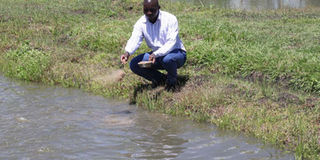We must tap ‘blue economy’ for progress

Wilson Otieno feeds fish being reared in ponds in Homa Bay County on May 11, 2016. The uptake of aquaculture in Kenya will boost employment. PHOTO | TOM OTIENO | NATION MEDIA GROUP
What you need to know:
- Blue growth will promote trade, increase revenue from exports and curb unemployment.
- The government recognises the importance of preserving the ocean due to its impact on lives today and in future.
Kenya’s blue economy represents the latest global move towards marine-based economic development.
Its space in the Indian Ocean as well as inland waters holds promise for the exploitation of sectors such as industrial fisheries, aquaculture, marine tourism, transport, container repair and cleaning, ship-building and repair, coastal and inland shipping, bio-prospecting energy, sand-seabed mining.
The blue economy encompasses resources in the oceans and inland water bodies.
CONSERVATION
This, unlike the green economy (agriculture), has been the least understood and explored pillar.
On September 25, the world adopted 17 Sustainable Development Goals (SDGs) as a follow-up to the Millennium Development Goals (MDGs) to end poverty, protect the planet and ensure prosperity for all.
Listed 14th is the goal to ‘Conserve and sustainably use the oceans, seas and marine resources’.
EMPLOYMENT
In January, President Uhuru Kenyatta commissioned a Blue Economy Committee to prioritise programmes for the development of blue growth potential.
Maritime transport and human resource capacity building have emerged as the most potential areas to provide wealth and create jobs for youth.
With Mombasa Port recording an annual throughput of 22 million tonnes, there is no reason why part of that cargo should not be carried on Kenyan-owned ships, just as Kenya Airways has flown the national flag in the aviation industry.
It is in this regard that a new strategic direction to revive the Kenya National Shipping Line (KNSL) as the national carrier has been adopted.
GREENHOUSE GASES
As a member of the International Maritime Organisation (IMO), the United Nations agency responsible for the safety and security of shipping and the prevention of marine pollution, the government is putting in place measures to implement IMO resolutions for sustainable development through green shipping.
One of the aims is to reduce greenhouse gas emissions through energy efficiency and increased uptake of low-carbon technologies in the maritime industry.
This is because climate change affects marine life through acidification of the water bodies, changes in circulation patterns, sea-level rise and ecological changes.
GREEN SHIPPING
Shipping accounts for an average of 2.7 per cent of the annual global CO2.
Studies project an increase of 50 to 250 per cent in the period up to 2050.
Kenya has been elected to host the Regional Maritime Technology Cooperation Centre for the African region.
The centre will promote the reduction of harmful emissions from ships.
The coastal ecosystem, with its accompanying goods and services, is worth Sh440 billion; a huge part of which can be tapped directly from marine-related tourism.
MARITIME SECURITY
The government recognises the importance of preserving the ocean due to its impact on lives today and in future.
Local communities, who are the immediate beneficiaries of the ocean, are being sensitised on the impact of climate change and pollution to empower them to take charge in charting their future and that of generations to come.
With recent discoveries and off-shore exploration, deep-sea fishing, seaweed farming, aquaculture, offshore oil and gas extraction and the expected growth in cargo volumes, there is a need to boost maritime security.
SURVIVAL
Blue growth will promote trade, increase revenue from exports and curb unemployment.
The ocean is of utmost importance to our nation and we are proud to be part of this global initiative.
A healthy world ocean is critical to our national survival.
The World Oceans Day provides us with a unique opportunity do all we can to honour, protect, and conserve our oceans.
Ms Karigithu is Kenya's shipping and maritime affairs principal secretary




